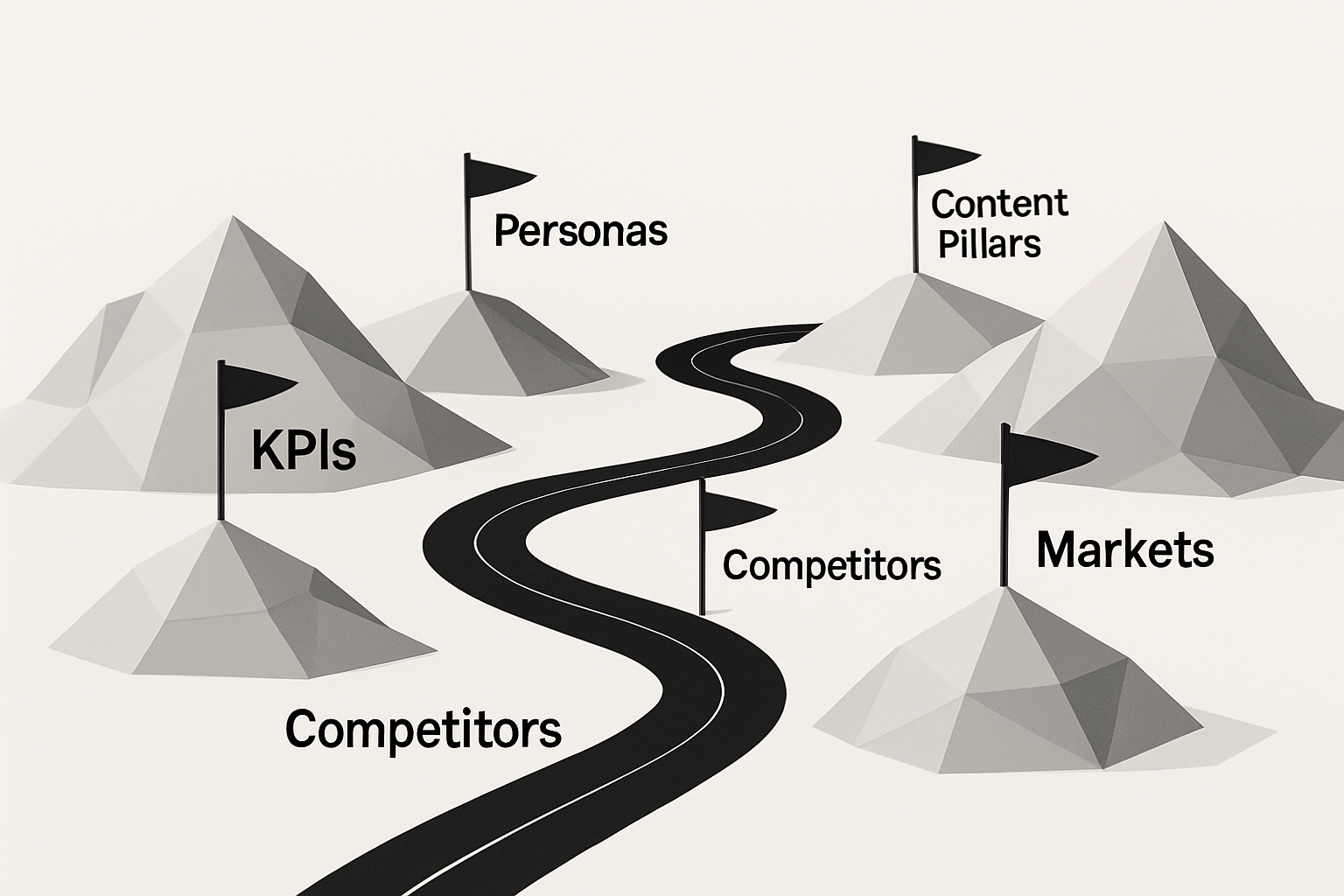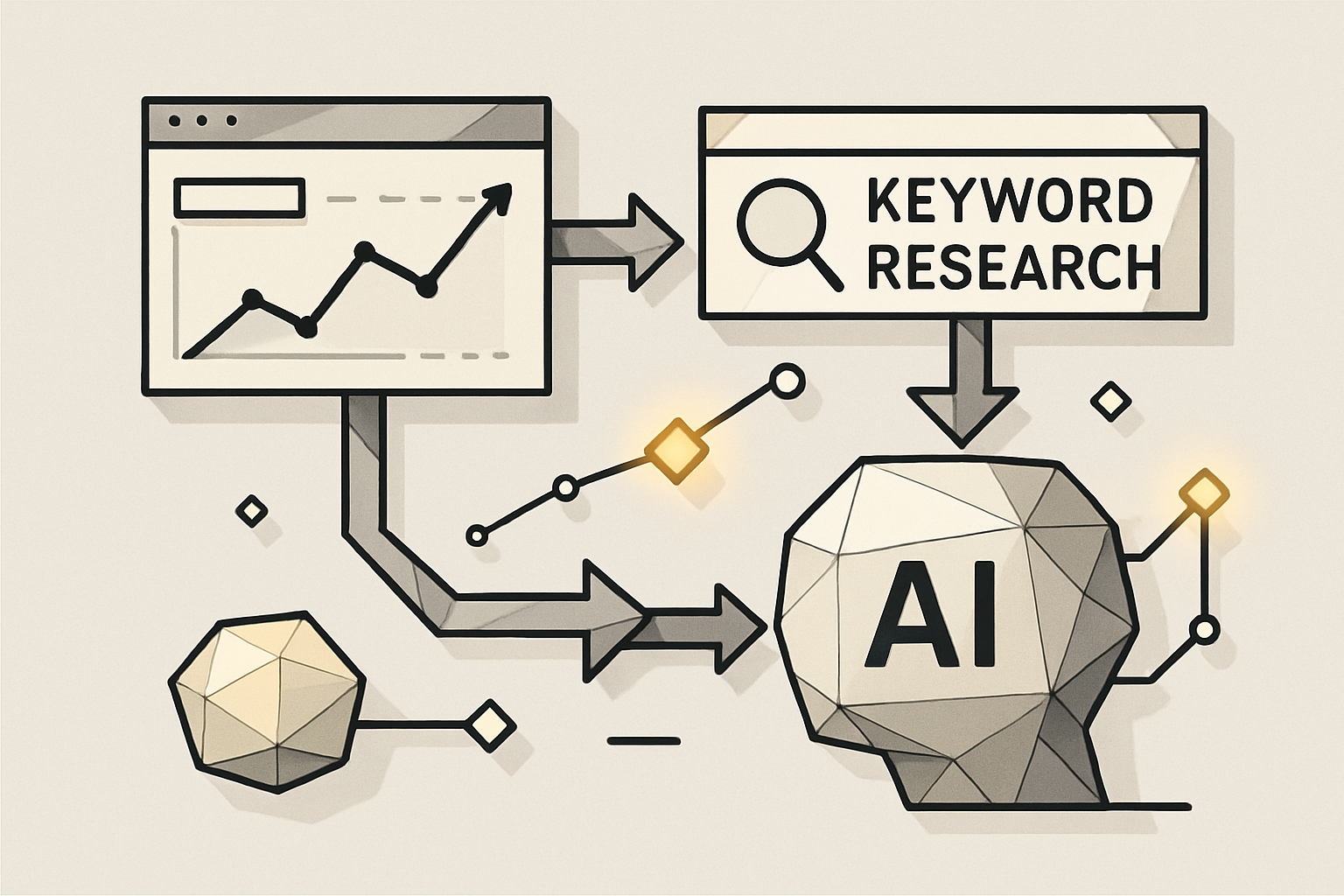Imagine slashing hours off your SEO workflow while uncovering high-impact keywords your competitors miss. Sound impossible? Not anymore.
Manual keyword research in 2025 is more complex and time-consuming than ever. The sheer volume of data and constant SERP changes make it overwhelming for even seasoned marketers.
That’s why the push to automate keyword research is taking the digital world by storm. Automation brings speed, accuracy, and scale, letting you find hidden opportunities and stay ahead.
This guide will show you, step by step, how to automate keyword research for 2025. Get ready for tool recommendations, workflow tips, and real-world examples to help you outpace the competition.
Understanding Automated Keyword Research in 2025
In 2025, the pressure to automate keyword research is greater than ever. As digital competition intensifies, traditional manual methods can’t keep up with the pace and scale required for modern SEO. Automation is no longer a luxury; it’s the backbone of efficient keyword strategies.

Defining Automated Keyword Research
To automate keyword research in 2025 means leveraging advanced technologies—AI, natural language processing (NLP), and big data—to identify, cluster, and analyze keywords at scale. Unlike manual research, which is slow and subjective, automation uses algorithms to process millions of data points in seconds. Machine learning models now handle keyword clustering and search intent analysis, giving SEOs a strategic edge. With the rise of transformer-based NLP models, like those discussed in this overview of advancements in transformer-based NLP models, automation can now understand language context and user intent far deeper than before. This evolution is at the heart of how we automate keyword research today.
Why Automation is Essential for Modern SEO
The sheer volume of search data and the complexity of search engine results pages (SERPs) in 2025 make manual keyword research nearly obsolete. Industry surveys reveal that 70% of top-ranking sites now automate keyword research to discover high-impact opportunities efficiently. Automation empowers agencies and in-house teams to scale their efforts, track shifting trends, and respond quickly to algorithm changes. Without automation, it’s easy to fall behind competitors who move faster and smarter.
Benefits Over Manual Keyword Research
When you automate keyword research, the advantages are tangible:
- Time savings: Automation reduces research time by up to 80%.
- Accuracy: AI tools minimize human error and bias.
- Depth: Instantly analyze thousands of keywords and uncover hidden gems.
This approach lets marketers focus on strategy and creative execution, not repetitive tasks. The ability to automate keyword research means you can keep up with evolving search landscapes while maintaining quality.
Limitations and Considerations
Despite its power, automation has pitfalls. Over-reliance on tools can lead to missing contextual nuances or misinterpreting data. Human oversight is essential to ensure results are relevant and actionable. Other considerations include:
- Data privacy: Automated scraping must comply with regulations.
- Ethical use: Only collect and process data transparently.
- Tool limitations: Not all tools are equal; some may lack accuracy or up-to-date data.
Balancing technology with human expertise is key as you automate keyword research.
Real-World Example: Automation in Action
Consider an e-commerce site that decided to automate keyword research in early 2025. By switching to an AI-driven workflow, they discovered over 1,500 new keyword opportunities and clustered them by intent. Within six months, organic traffic jumped 120%. The team used a combination of NLP-powered analysis, competitor tracking, and automated reporting to optimize their content strategy. This real-world result shows how the decision to automate keyword research can lead to measurable growth and a clear edge over competitors.
Step 1: Setting Goals and Defining Your SEO Strategy
Setting the right foundation is crucial before you automate keyword research. By clarifying your business goals and understanding your audience, you’ll ensure that every automated process serves your broader SEO objectives. Let’s break down the essential elements you need to define for a winning strategy in 2025.

Identifying Business Objectives and KPIs
Every attempt to automate keyword research should start with clear business objectives. Are you aiming to boost organic traffic, increase conversions, or improve brand visibility? Pin down your top priorities.
Next, select measurable KPIs that reflect these goals. Common choices include organic visits, keyword rankings, and conversion rates. Here’s a quick table for reference:
| Objective | KPI Example |
|---|---|
| Increase traffic | Organic sessions |
| Boost conversions | Goal completions |
| Brand awareness | Branded keyword rank |
Regularly review these KPIs to ensure your automation efforts align with real business outcomes.
Mapping Buyer Personas and Search Intent
To automate keyword research effectively, you need to know who you’re targeting and why they search. Use automation tools to analyze audience demographics and psychographics. These insights reveal what matters to your buyers.
Automated systems can cluster keywords by intent—informational, transactional, or navigational. This ensures your content addresses each stage of the customer journey.
By mapping personas and search intent, you’ll create more relevant keyword lists and content that resonates.
Competitor Benchmarking with Automated Tools
Understanding where your competitors stand is key when you automate keyword research. Automated competitor analysis tools can quickly surface hundreds of untapped keywords and identify gaps in their content strategies.
For example, you might find over 500 new keyword opportunities just by scanning your top rivals. Many leading platforms streamline this process, as highlighted in this Comprehensive review of top SEO tools in 2025.
Benchmarking gives you a data-driven edge, helping you stay ahead of the curve.
Selecting the Right Markets and Languages
As you automate keyword research, don’t overlook market selection. Automation makes it easier to analyze multiple regions and languages at scale.
Decide whether your focus is global or local. Automated tools can show you which markets have high potential and where competition is lighter. This lets you tailor your strategy for maximum impact.
Keep language and cultural nuances in mind to ensure your keywords connect with each audience.
Prioritizing Topics and Content Pillars
Automated systems can analyze search trends and volumes to help you discover high-priority topics. By clustering keywords into themes, you’ll uncover content pillars that can shape your editorial calendar.
Build out your content plan using these insights. Automation streamlines the process, freeing you to focus on creativity while ensuring your strategy is always data-driven.
Step 2: Choosing the Best Tools for Automated Keyword Research
Choosing the right tools to automate keyword research is a game-changer for SEO professionals in 2025. With the right platform, you can boost efficiency, uncover hidden opportunities, and stay ahead of the competition—all while saving countless hours each week.

Types of Automated Keyword Research Tools
Today’s landscape offers a wide variety of options to automate keyword research. AI-powered platforms analyze massive search datasets, browser extensions offer quick SERP insights, and APIs allow developers to build custom workflows. All-in-one SEO suites bundle features like keyword discovery, clustering, and competitor tracking, while specialized tools focus on deep keyword mining or intent analysis.
Selecting the right type depends on your needs. For large-scale operations, robust platforms with API access are ideal. For quick wins, browser-based tools or plugins can help automate keyword research on the fly.
Key Features to Look For in 2025
The best tools to automate keyword research in 2025 offer advanced capabilities:
- Real-time SERP analysis
- Intent detection powered by AI
- Automatic keyword clustering
- Competitor tracking and gap analysis
- Integration with content management systems
Look for platforms that seamlessly connect with your analytics and publishing workflows. AI-driven features like natural language processing and machine learning are now essential to automate keyword research at scale and deliver actionable insights.
Leading Tools for Automated Keyword Research
Several top-rated platforms stand out for their ability to automate keyword research. Here’s a quick comparison:
| Tool | Unique Selling Points | Best For |
|---|---|---|
| Semrush | Comprehensive database, API, content templates | Agencies, Enterprises |
| Ahrefs | Backlink insights, keyword explorer, fast updates | SEOs, Marketers |
| Moz | User-friendly interface, SERP features, local SEO | SMBs, Beginners |
| Surfer SEO | NLP-driven content editor, real-time SERP data | Content Teams |
Each tool offers unique strengths. Consider which platform aligns with your goals and how effectively it can automate keyword research for your business.
Pricing, Scalability, and Ease of Use
When you automate keyword research, budget and scalability matter. Most leading tools use a subscription model, with free trials or limited free plans available. Agencies and enterprises benefit from higher-tier plans with more data and user seats, while solopreneurs can start small and scale up.
Ease of use is critical—look for intuitive dashboards, clear reports, and helpful onboarding. The ability to automate keyword research across multiple projects or clients is a must for growing teams.
Evaluating Tool Accuracy and Data Sources
Accuracy is the backbone of any effort to automate keyword research. Reliable tools draw from up-to-date, trustworthy data sources and apply advanced algorithms for keyword clustering and intent analysis. Spot-check automated results manually to ensure relevance.
For those interested in the underlying technology, advances in machine learning are pushing the boundaries of keyword clustering—Efficient continual learning in keyword spotting offers insights into these innovations. Always validate data sources, and choose platforms that prioritize transparency and regular updates.
Step 3: Building and Automating Your Keyword Research Workflow
Ready to take your SEO to the next level? To automate keyword research effectively, you need a streamlined, repeatable workflow. This step is where technology and strategy meet, transforming hours of manual digging into a few clicks. Let’s break down the practical steps to build a workflow that’s fast, accurate, and built for scale.

Setting Up Automated Keyword Discovery
Start by choosing a tool that lets you automate keyword research from the ground up. Input your main seed keywords and let the tool expand them into thousands of related terms instantly.
Most platforms use AI to suggest long-tail opportunities, trending queries, and keyword variations. This isn’t just about speed—automation uncovers hidden gems you might miss with manual processes.
To maximize results, schedule recurring keyword scans. This ensures your research stays fresh, adapting to search trends and seasonal shifts.
Automating Competitor Keyword Analysis
A major advantage when you automate keyword research is the ability to monitor competitors at scale. Set up automated tracking to pull in your rivals’ top-ranking keywords, new content, and shifting SERP positions.
Weekly reports can be delivered straight to your inbox, saving hours on manual checks. Use these insights to spot gaps in their strategies and find untapped opportunities for your own site.
Automation here means you’ll always have a pulse on the competition without the grunt work.
Keyword Clustering and Grouping with AI
AI-driven clustering is a game-changer when you automate keyword research. Machine learning algorithms group keywords by topic, intent, or funnel stage, simplifying content planning for large sites.
This helps you organize massive keyword lists into actionable clusters. With these groups, you can plan pillar pages, topic clusters, and supporting articles for maximum impact.
Automated clustering also improves internal linking and user experience, driving better SEO results.
Filtering and Prioritizing Keyword Lists
After you automate keyword research, you’ll have a mountain of data. Automated filters help you sort keywords by metrics like search volume, competition, CPC, and intent.
Set up custom alerts for high-value keywords or sudden shifts in search demand. This approach lets you focus on the keywords that actually move the needle.
With automation, you avoid analysis paralysis and keep your strategy laser-focused.
Integrating Automation with Content Planning Tools
Connecting your keyword tools with content calendars and project management platforms is key. This integration streamlines the journey from research to publication.
With seamless handoffs, your team can quickly act on new keyword opportunities. For those optimizing for emerging trends like Answer Engine Optimization (AEO) strategies, automated workflows ensure content is tailored for AI-driven search results.
An integrated workflow boosts efficiency, ensuring every keyword insight becomes actionable content.
How RankPill Streamlines Keyword Research Automation
RankPill’s AI-powered platform is designed to automate keyword research from start to finish. It handles keyword discovery, competitor analysis, and clustering with minimal manual input.
Users report cutting their research time in half and increasing their content ROI. Automated dashboards and reports keep your team aligned and proactive.
Businesses using RankPill have seen dramatic improvements in both workflow speed and organic growth.
Step 4: Validating and Refining Automated Keyword Results
Automated tools can supercharge your SEO, but the real magic happens when you validate and refine those results. Even the best systems need a human touch. Let’s walk through how to ensure your efforts to automate keyword research deliver accurate, relevant, and actionable data every time.
Ensuring Data Quality and Relevance
When you automate keyword research, it’s essential to check the quality of your keyword suggestions. Start by manually spot-checking a sample of the keywords your tool generates.
- Look for outdated or irrelevant terms.
- Remove duplicates or off-topic keywords.
- Confirm that the keywords align with your brand and content goals.
A quick review helps you catch issues before they impact your SEO strategy. Even with automation, a few minutes of human oversight can make all the difference.
SERP Analysis and Intent Verification
Automated SERP analysis tools give you a snapshot of keyword competitiveness and search intent. To automate keyword research effectively, set up scripts or use platforms that capture real-time SERP data.
# Example: Python pseudo-code to fetch top 10 SERP results
import serpapi
results = serpapi.search("your keyword")
print(results['organic_results'])
Reviewing SERP snapshots ensures your keywords match the right intent and aren’t too competitive. This step keeps your strategy focused and relevant.
Testing and Iterating Keyword Lists
A/B testing is your friend when you automate keyword research. Try using different sets of keywords in similar content and track which performs better.
- Monitor organic traffic, rankings, and engagement.
- Use analytics to compare results over time.
- Adjust your automated workflow based on findings.
Testing helps you refine your keyword list, ensuring you only target terms that move the needle for your business.
Integrating User Feedback and Analytics
Don’t overlook real-world input. Use website analytics to validate how your chosen keywords perform after you automate keyword research. Pay attention to user search queries, bounce rates, and conversion data.
Incorporate customer feedback to spot gaps or new opportunities. Feeding this data back into your process helps your automation get smarter over time.
Avoiding Common Pitfalls in Automation
Automation is powerful, but it’s not foolproof. Here’s a quick table of common pitfalls and how to avoid them:
| Pitfall | Solution |
|---|---|
| Overfitting lists | Keep reviewing manually |
| Ignoring low-volume | Check for hidden gems regularly |
| Missing trends | Automate trend tracking alerts |
Always review your process to improve accuracy. Smart adjustments help you automate keyword research without losing the nuance only a human can provide.
Step 5: Scaling and Maintaining Automated Keyword Research
Scaling your efforts to automate keyword research unlocks consistent growth, even as your business and competition evolve. By building a sustainable workflow, you ensure your SEO strategy adapts to new opportunities and challenges. Let’s break down how to keep your keyword automation engine running smoothly at scale.
Automating Ongoing Keyword Discovery
To maintain SEO momentum, set up recurring scans that automatically surface new keyword opportunities. Use scheduling features in your tools to run weekly or monthly reports. This proactive approach helps you automate keyword research, so you never miss out on trending or seasonal terms.
- Schedule automated keyword scans
- Set up alerts for new opportunities
- Integrate with trend monitoring tools
Consistent keyword discovery keeps your SEO pipeline full and responsive to search landscape shifts.
Monitoring Competitor Movements Automatically
Stay ahead by tracking your competitors’ keyword strategies without manual effort. Most automation platforms let you monitor ranking changes, new content, and keyword gaps. When you automate keyword research for competitor tracking, you can receive instant alerts about significant moves.
- Enable automated competitor tracking
- Get notified of ranking shifts
- Spot new competitor content quickly
This lets you react quickly to market changes and seize gaps before others do.
Integrating with Content Production and SEO Workflows
Seamless integration between keyword research and content creation boosts efficiency and output. Connect your automation tools directly to your CMS or project management software. When you automate keyword research into your workflow, your team gets real-time access to prioritized keyword lists and content briefs.
| Integration Options | Benefits |
|---|---|
| CMS plugins | Direct keyword import |
| Project management API | Automated task creation |
| Editorial calendar | Real-time keyword updates |
Automation streamlines the journey from research to publication, reducing delays and boosting productivity.
Leveraging Automation for International and Multilingual SEO
Expanding globally? Automation makes multilingual keyword research scalable. Use tools that support multiple languages and regions to automate keyword research for international markets. This way, you can identify local search trends and translate keywords accurately.
- Run automated scans in different languages
- Identify regional keyword opportunities
- Automate translation and localization
This approach ensures your content resonates with audiences worldwide, increasing reach and relevance.
Measuring and Reporting ROI of Automation
Track the impact of your automated workflows with built-in reporting features. Set up dashboards that automatically pull key SEO metrics and visualize growth. When you automate keyword research reporting, you can quickly demonstrate ROI to stakeholders.
- Monitor increases in organic traffic
- Track keyword ranking improvements
- Report on content output and efficiency
Automated reporting frees you to focus on strategy, while proving the value of your SEO investment.
The Future of Keyword Research Automation: Trends to Watch in 2025
The future of SEO is unfolding rapidly, and if you want to stay ahead, you must understand the trends shaping how we automate keyword research. In 2025, groundbreaking advancements in AI, voice technology, predictive analytics, and data privacy are transforming every corner of the SEO landscape.
AI and NLP Advancements in Keyword Research
AI and NLP are revolutionizing how we automate keyword research. Generative AI models now analyze vast datasets, uncovering keyword opportunities that were previously hidden. These tools understand context, synonyms, and even user intent far better than old-school methods.
Machine learning algorithms cluster keywords based on meaning, not just string matching. This leads to more accurate targeting and higher relevance. As a result, you can automate keyword research to discover long-tail phrases and semantic topics with ease.
Integration with Voice and Visual Search
Voice and visual search are no longer futuristic—they’re mainstream in 2025. To automate keyword research effectively, you must account for how people speak and search with images.
AI tools now analyze voice queries and image metadata, generating keyword lists tailored for these formats. For example, optimizing for natural language queries and visual descriptions gives your content a competitive edge. Staying ahead here means your automation covers all search touchpoints.
Predictive Analytics and Search Trend Forecasting
Predictive analytics is a game-changer as you automate keyword research. Modern platforms use machine learning to forecast trending topics and search terms before they peak.
You can set up automated alerts for emerging trends, ensuring your content is always timely. This proactive approach means you never play catch-up. Instead, you publish content that matches rising demand, capitalizing on new opportunities as they emerge.
Ethical Considerations and Data Privacy
As you automate keyword research, ethical and privacy concerns take center stage. Automated tools often rely on scraping and large-scale data collection, which must comply with evolving privacy laws.
Staying transparent about your data sources is crucial. Ensure your automation respects user privacy and follows regulations like GDPR. Prioritizing ethics helps build trust with both users and search engines, safeguarding your brand’s reputation.
Preparing Your SEO Team for Full Automation
Preparing your team to automate keyword research is essential for long-term success. Upskilling in AI-driven workflows empowers your staff to leverage automation’s full potential.
Balance is key—combine automation’s speed and scale with human creativity and strategic thinking. Training programs and continuous learning keep your team agile, ready to adapt to new tools and trends as they arise.
If you’re ready to finally reclaim your time and let automation do the heavy lifting for your SEO, you’re in the right place. We’ve explored how smart tools can help you uncover winning keywords, analyze your competitors, and keep your content pipeline full—without the overwhelm. Imagine focusing more on strategy and creativity, while AI handles the grunt work. If you want to put these insights into action and experience truly effortless keyword research, you don’t have to wait. Let’s take the next step together—Get Started and see how easy SEO can really be.